Ethical Conflict and Turbulence in the Legal Profession
VerifiedAdded on 2023/01/11
|9
|2262
|76
AI Summary
This report discusses the ethical conflicts and turbulence faced by lawyers in the legal profession, with a focus on the UK. It explores the different roles of solicitors and barristers, the ethical considerations they must adhere to, and the impact of these conflicts on clients and the profession as a whole.
Contribute Materials
Your contribution can guide someone’s learning journey. Share your
documents today.
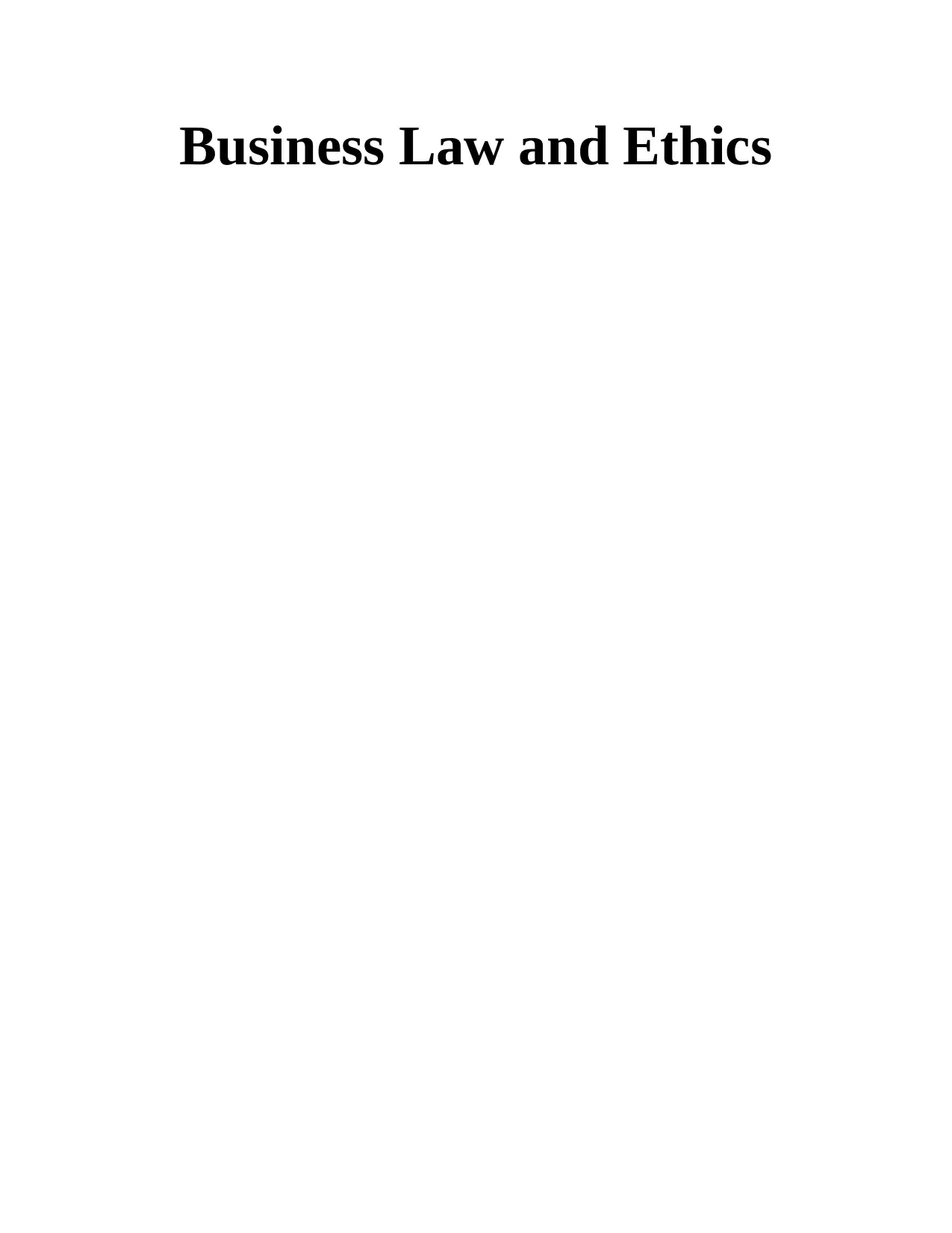
Business Law and Ethics
Secure Best Marks with AI Grader
Need help grading? Try our AI Grader for instant feedback on your assignments.
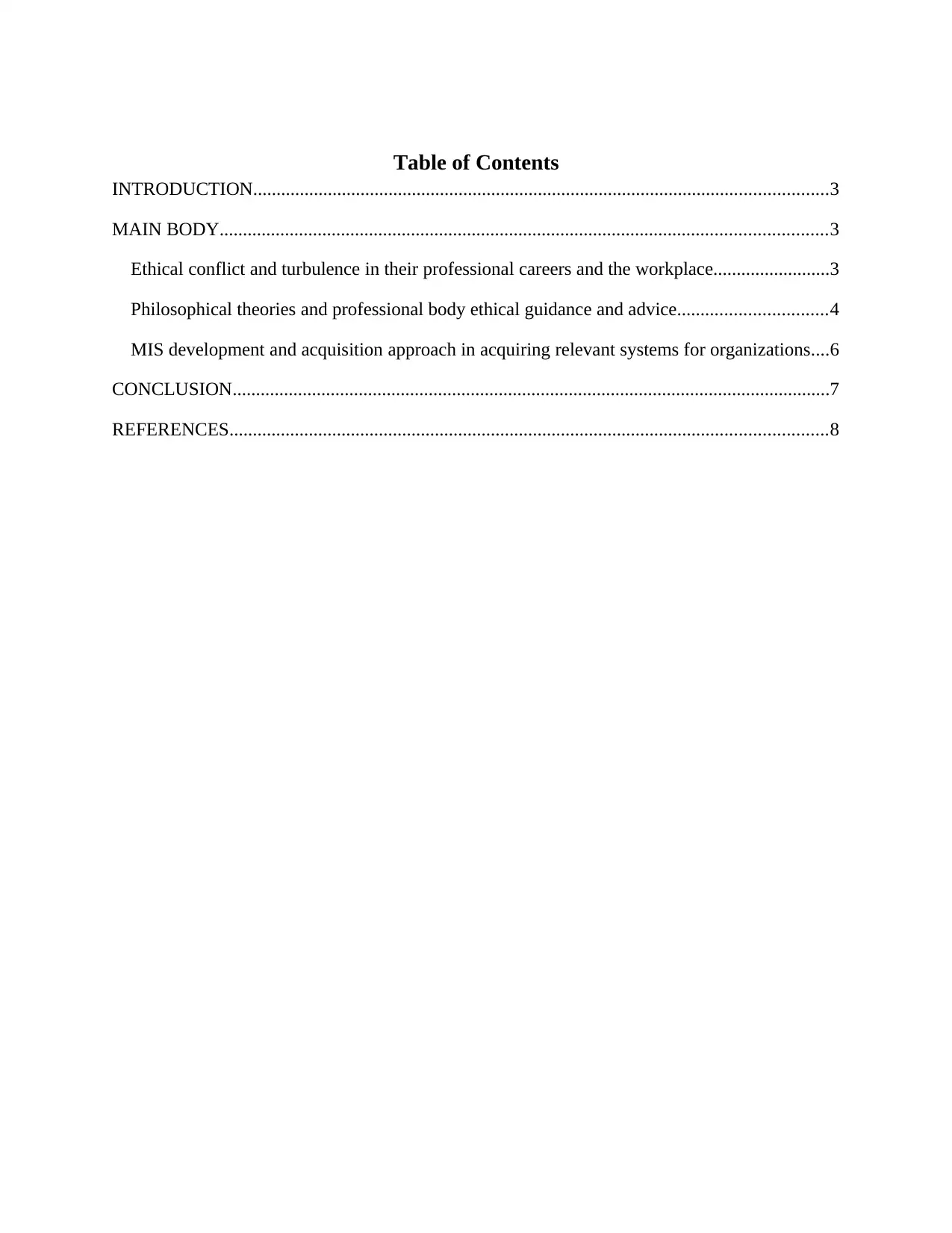
Table of Contents
INTRODUCTION...........................................................................................................................3
MAIN BODY..................................................................................................................................3
Ethical conflict and turbulence in their professional careers and the workplace.........................3
Philosophical theories and professional body ethical guidance and advice................................4
MIS development and acquisition approach in acquiring relevant systems for organizations....6
CONCLUSION................................................................................................................................7
REFERENCES................................................................................................................................8
INTRODUCTION...........................................................................................................................3
MAIN BODY..................................................................................................................................3
Ethical conflict and turbulence in their professional careers and the workplace.........................3
Philosophical theories and professional body ethical guidance and advice................................4
MIS development and acquisition approach in acquiring relevant systems for organizations....6
CONCLUSION................................................................................................................................7
REFERENCES................................................................................................................................8
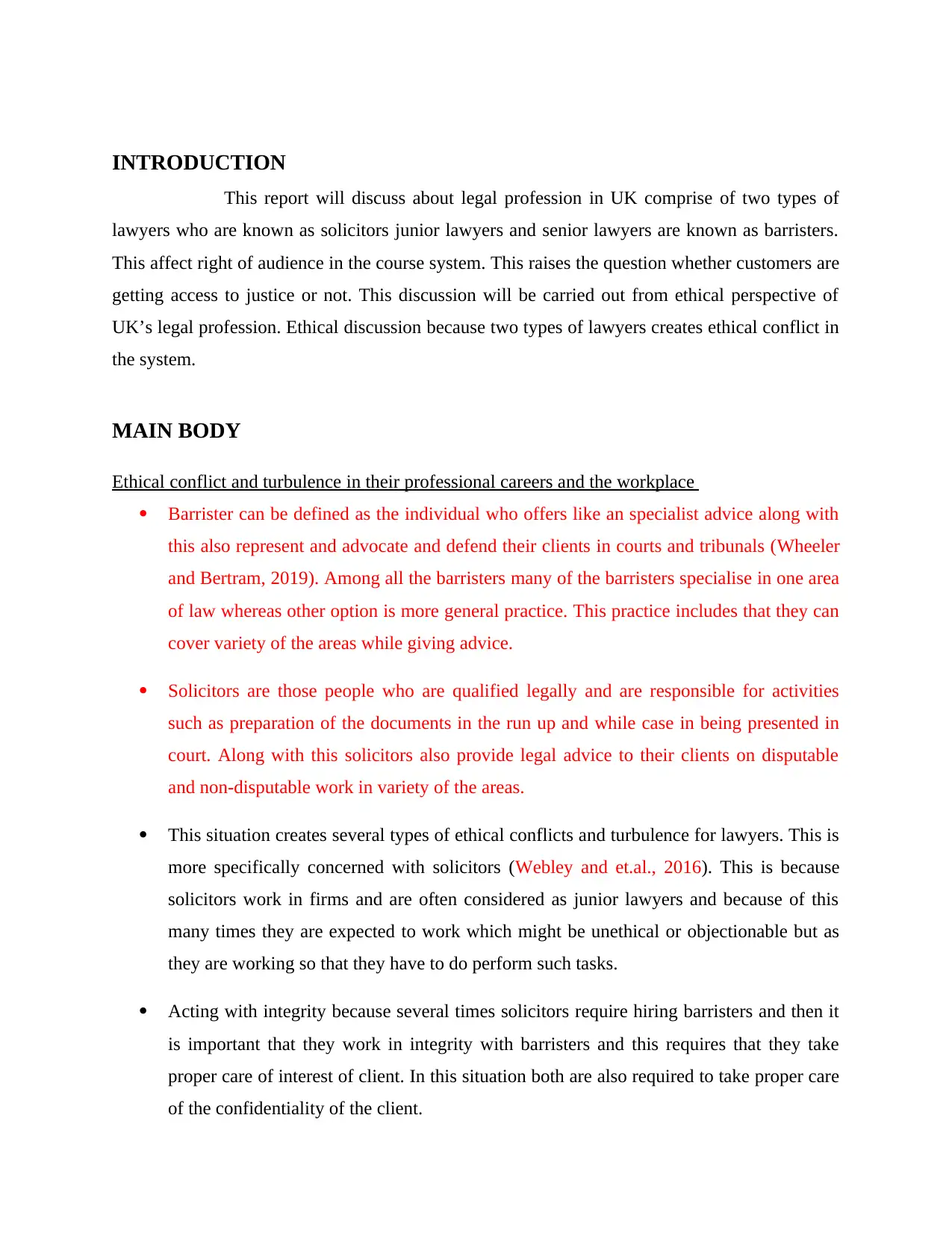
INTRODUCTION
This report will discuss about legal profession in UK comprise of two types of
lawyers who are known as solicitors junior lawyers and senior lawyers are known as barristers.
This affect right of audience in the course system. This raises the question whether customers are
getting access to justice or not. This discussion will be carried out from ethical perspective of
UK’s legal profession. Ethical discussion because two types of lawyers creates ethical conflict in
the system.
MAIN BODY
Ethical conflict and turbulence in their professional careers and the workplace
Barrister can be defined as the individual who offers like an specialist advice along with
this also represent and advocate and defend their clients in courts and tribunals (Wheeler
and Bertram, 2019). Among all the barristers many of the barristers specialise in one area
of law whereas other option is more general practice. This practice includes that they can
cover variety of the areas while giving advice.
Solicitors are those people who are qualified legally and are responsible for activities
such as preparation of the documents in the run up and while case in being presented in
court. Along with this solicitors also provide legal advice to their clients on disputable
and non-disputable work in variety of the areas.
This situation creates several types of ethical conflicts and turbulence for lawyers. This is
more specifically concerned with solicitors (Webley and et.al., 2016). This is because
solicitors work in firms and are often considered as junior lawyers and because of this
many times they are expected to work which might be unethical or objectionable but as
they are working so that they have to do perform such tasks.
Acting with integrity because several times solicitors require hiring barristers and then it
is important that they work in integrity with barristers and this requires that they take
proper care of interest of client. In this situation both are also required to take proper care
of the confidentiality of the client.
This report will discuss about legal profession in UK comprise of two types of
lawyers who are known as solicitors junior lawyers and senior lawyers are known as barristers.
This affect right of audience in the course system. This raises the question whether customers are
getting access to justice or not. This discussion will be carried out from ethical perspective of
UK’s legal profession. Ethical discussion because two types of lawyers creates ethical conflict in
the system.
MAIN BODY
Ethical conflict and turbulence in their professional careers and the workplace
Barrister can be defined as the individual who offers like an specialist advice along with
this also represent and advocate and defend their clients in courts and tribunals (Wheeler
and Bertram, 2019). Among all the barristers many of the barristers specialise in one area
of law whereas other option is more general practice. This practice includes that they can
cover variety of the areas while giving advice.
Solicitors are those people who are qualified legally and are responsible for activities
such as preparation of the documents in the run up and while case in being presented in
court. Along with this solicitors also provide legal advice to their clients on disputable
and non-disputable work in variety of the areas.
This situation creates several types of ethical conflicts and turbulence for lawyers. This is
more specifically concerned with solicitors (Webley and et.al., 2016). This is because
solicitors work in firms and are often considered as junior lawyers and because of this
many times they are expected to work which might be unethical or objectionable but as
they are working so that they have to do perform such tasks.
Acting with integrity because several times solicitors require hiring barristers and then it
is important that they work in integrity with barristers and this requires that they take
proper care of interest of client. In this situation both are also required to take proper care
of the confidentiality of the client.
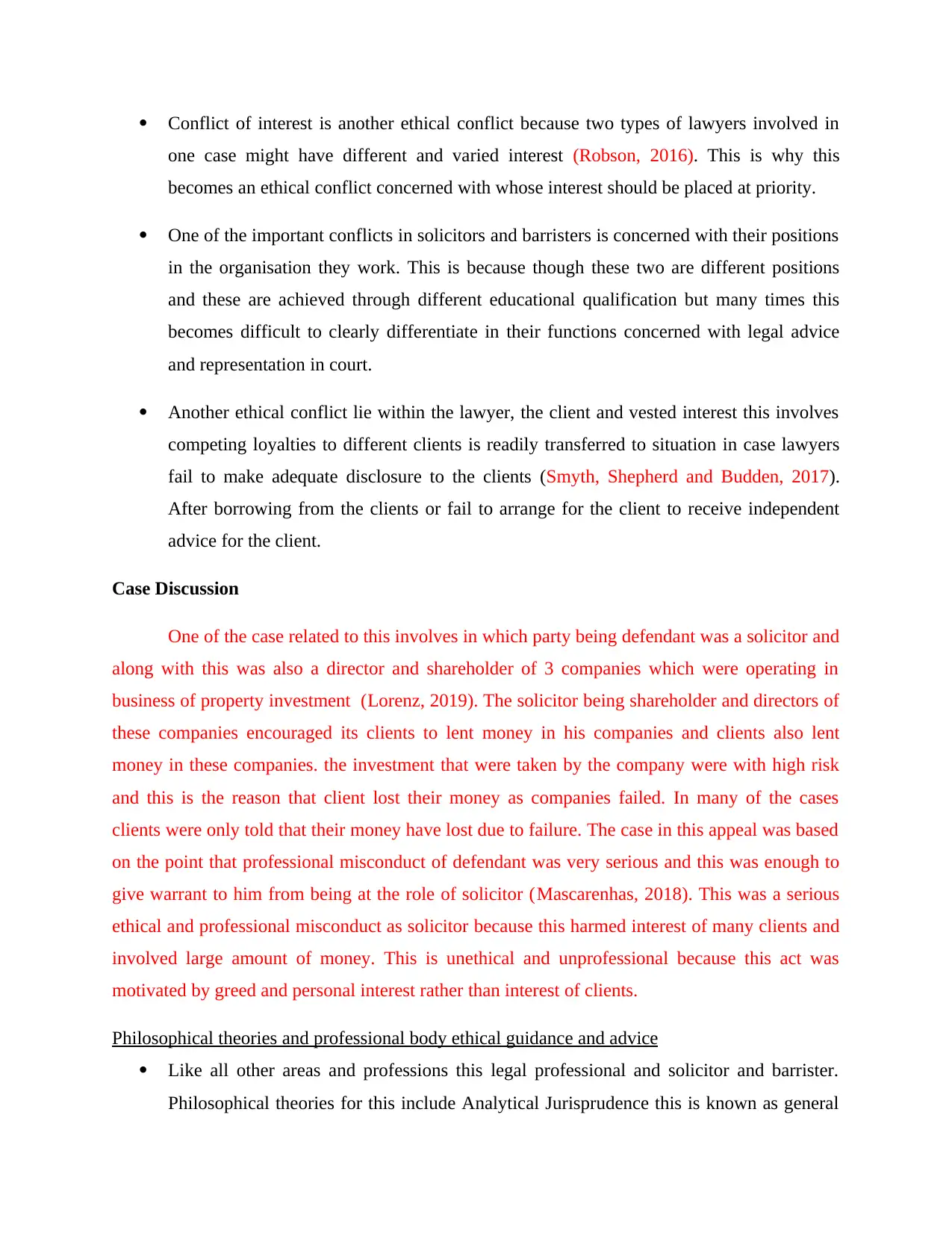
Conflict of interest is another ethical conflict because two types of lawyers involved in
one case might have different and varied interest (Robson, 2016). This is why this
becomes an ethical conflict concerned with whose interest should be placed at priority.
One of the important conflicts in solicitors and barristers is concerned with their positions
in the organisation they work. This is because though these two are different positions
and these are achieved through different educational qualification but many times this
becomes difficult to clearly differentiate in their functions concerned with legal advice
and representation in court.
Another ethical conflict lie within the lawyer, the client and vested interest this involves
competing loyalties to different clients is readily transferred to situation in case lawyers
fail to make adequate disclosure to the clients (Smyth, Shepherd and Budden, 2017).
After borrowing from the clients or fail to arrange for the client to receive independent
advice for the client.
Case Discussion
One of the case related to this involves in which party being defendant was a solicitor and
along with this was also a director and shareholder of 3 companies which were operating in
business of property investment (Lorenz, 2019). The solicitor being shareholder and directors of
these companies encouraged its clients to lent money in his companies and clients also lent
money in these companies. the investment that were taken by the company were with high risk
and this is the reason that client lost their money as companies failed. In many of the cases
clients were only told that their money have lost due to failure. The case in this appeal was based
on the point that professional misconduct of defendant was very serious and this was enough to
give warrant to him from being at the role of solicitor (Mascarenhas, 2018). This was a serious
ethical and professional misconduct as solicitor because this harmed interest of many clients and
involved large amount of money. This is unethical and unprofessional because this act was
motivated by greed and personal interest rather than interest of clients.
Philosophical theories and professional body ethical guidance and advice
Like all other areas and professions this legal professional and solicitor and barrister.
Philosophical theories for this include Analytical Jurisprudence this is known as general
one case might have different and varied interest (Robson, 2016). This is why this
becomes an ethical conflict concerned with whose interest should be placed at priority.
One of the important conflicts in solicitors and barristers is concerned with their positions
in the organisation they work. This is because though these two are different positions
and these are achieved through different educational qualification but many times this
becomes difficult to clearly differentiate in their functions concerned with legal advice
and representation in court.
Another ethical conflict lie within the lawyer, the client and vested interest this involves
competing loyalties to different clients is readily transferred to situation in case lawyers
fail to make adequate disclosure to the clients (Smyth, Shepherd and Budden, 2017).
After borrowing from the clients or fail to arrange for the client to receive independent
advice for the client.
Case Discussion
One of the case related to this involves in which party being defendant was a solicitor and
along with this was also a director and shareholder of 3 companies which were operating in
business of property investment (Lorenz, 2019). The solicitor being shareholder and directors of
these companies encouraged its clients to lent money in his companies and clients also lent
money in these companies. the investment that were taken by the company were with high risk
and this is the reason that client lost their money as companies failed. In many of the cases
clients were only told that their money have lost due to failure. The case in this appeal was based
on the point that professional misconduct of defendant was very serious and this was enough to
give warrant to him from being at the role of solicitor (Mascarenhas, 2018). This was a serious
ethical and professional misconduct as solicitor because this harmed interest of many clients and
involved large amount of money. This is unethical and unprofessional because this act was
motivated by greed and personal interest rather than interest of clients.
Philosophical theories and professional body ethical guidance and advice
Like all other areas and professions this legal professional and solicitor and barrister.
Philosophical theories for this include Analytical Jurisprudence this is known as general
Secure Best Marks with AI Grader
Need help grading? Try our AI Grader for instant feedback on your assignments.
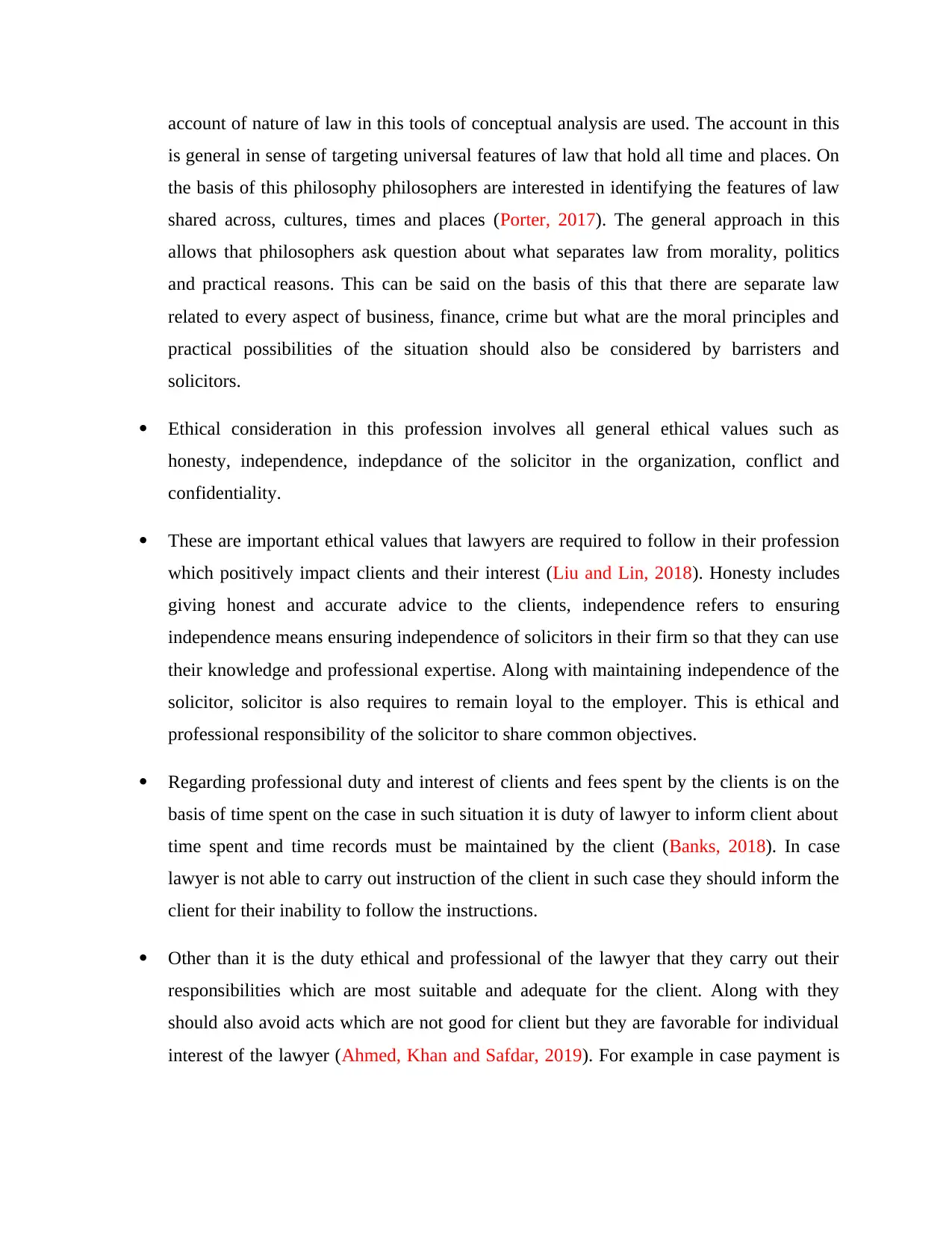
account of nature of law in this tools of conceptual analysis are used. The account in this
is general in sense of targeting universal features of law that hold all time and places. On
the basis of this philosophy philosophers are interested in identifying the features of law
shared across, cultures, times and places (Porter, 2017). The general approach in this
allows that philosophers ask question about what separates law from morality, politics
and practical reasons. This can be said on the basis of this that there are separate law
related to every aspect of business, finance, crime but what are the moral principles and
practical possibilities of the situation should also be considered by barristers and
solicitors.
Ethical consideration in this profession involves all general ethical values such as
honesty, independence, indepdance of the solicitor in the organization, conflict and
confidentiality.
These are important ethical values that lawyers are required to follow in their profession
which positively impact clients and their interest (Liu and Lin, 2018). Honesty includes
giving honest and accurate advice to the clients, independence refers to ensuring
independence means ensuring independence of solicitors in their firm so that they can use
their knowledge and professional expertise. Along with maintaining independence of the
solicitor, solicitor is also requires to remain loyal to the employer. This is ethical and
professional responsibility of the solicitor to share common objectives.
Regarding professional duty and interest of clients and fees spent by the clients is on the
basis of time spent on the case in such situation it is duty of lawyer to inform client about
time spent and time records must be maintained by the client (Banks, 2018). In case
lawyer is not able to carry out instruction of the client in such case they should inform the
client for their inability to follow the instructions.
Other than it is the duty ethical and professional of the lawyer that they carry out their
responsibilities which are most suitable and adequate for the client. Along with they
should also avoid acts which are not good for client but they are favorable for individual
interest of the lawyer (Ahmed, Khan and Safdar, 2019). For example in case payment is
is general in sense of targeting universal features of law that hold all time and places. On
the basis of this philosophy philosophers are interested in identifying the features of law
shared across, cultures, times and places (Porter, 2017). The general approach in this
allows that philosophers ask question about what separates law from morality, politics
and practical reasons. This can be said on the basis of this that there are separate law
related to every aspect of business, finance, crime but what are the moral principles and
practical possibilities of the situation should also be considered by barristers and
solicitors.
Ethical consideration in this profession involves all general ethical values such as
honesty, independence, indepdance of the solicitor in the organization, conflict and
confidentiality.
These are important ethical values that lawyers are required to follow in their profession
which positively impact clients and their interest (Liu and Lin, 2018). Honesty includes
giving honest and accurate advice to the clients, independence refers to ensuring
independence means ensuring independence of solicitors in their firm so that they can use
their knowledge and professional expertise. Along with maintaining independence of the
solicitor, solicitor is also requires to remain loyal to the employer. This is ethical and
professional responsibility of the solicitor to share common objectives.
Regarding professional duty and interest of clients and fees spent by the clients is on the
basis of time spent on the case in such situation it is duty of lawyer to inform client about
time spent and time records must be maintained by the client (Banks, 2018). In case
lawyer is not able to carry out instruction of the client in such case they should inform the
client for their inability to follow the instructions.
Other than it is the duty ethical and professional of the lawyer that they carry out their
responsibilities which are most suitable and adequate for the client. Along with they
should also avoid acts which are not good for client but they are favorable for individual
interest of the lawyer (Ahmed, Khan and Safdar, 2019). For example in case payment is
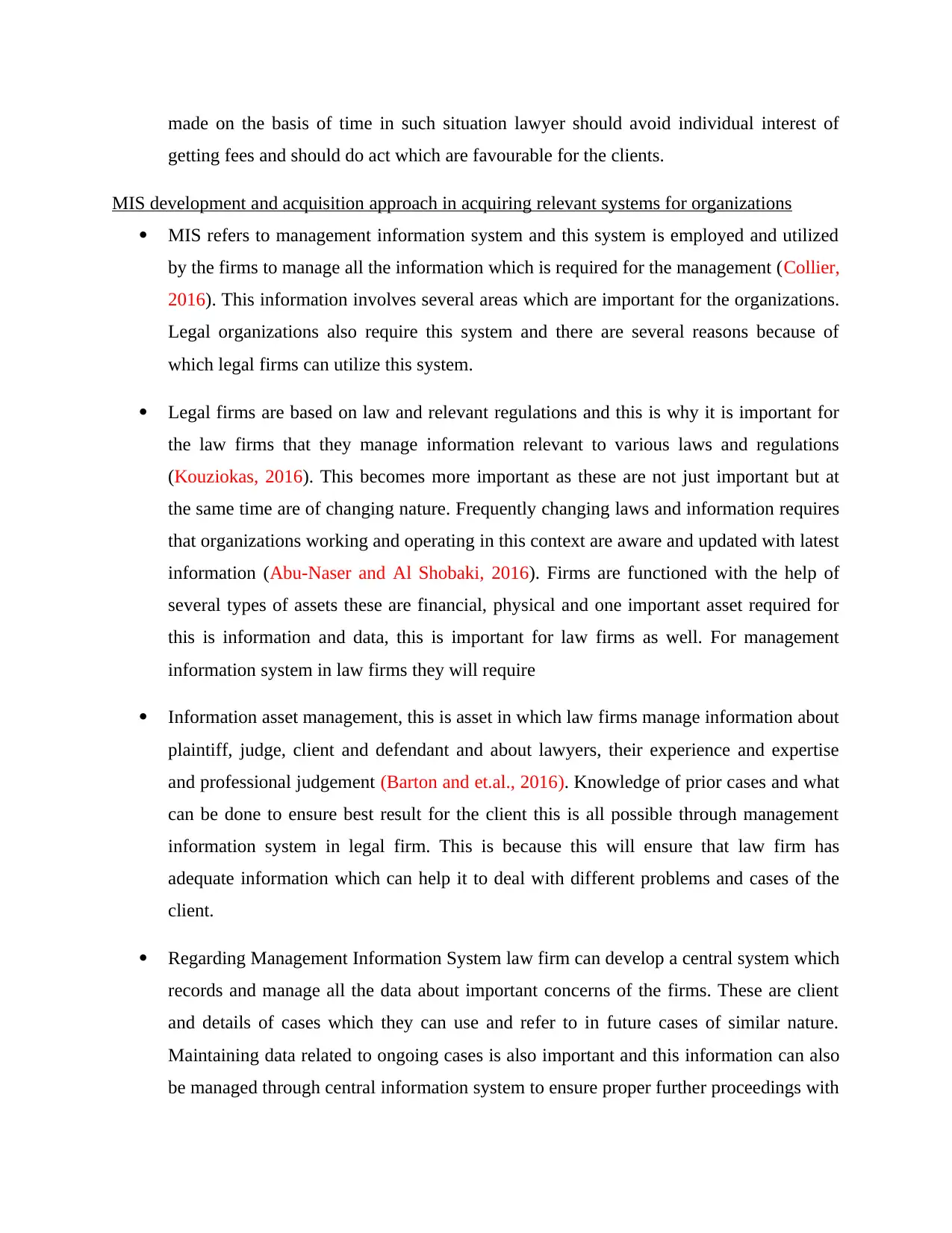
made on the basis of time in such situation lawyer should avoid individual interest of
getting fees and should do act which are favourable for the clients.
MIS development and acquisition approach in acquiring relevant systems for organizations
MIS refers to management information system and this system is employed and utilized
by the firms to manage all the information which is required for the management (Collier,
2016). This information involves several areas which are important for the organizations.
Legal organizations also require this system and there are several reasons because of
which legal firms can utilize this system.
Legal firms are based on law and relevant regulations and this is why it is important for
the law firms that they manage information relevant to various laws and regulations
(Kouziokas, 2016). This becomes more important as these are not just important but at
the same time are of changing nature. Frequently changing laws and information requires
that organizations working and operating in this context are aware and updated with latest
information (Abu-Naser and Al Shobaki, 2016). Firms are functioned with the help of
several types of assets these are financial, physical and one important asset required for
this is information and data, this is important for law firms as well. For management
information system in law firms they will require
Information asset management, this is asset in which law firms manage information about
plaintiff, judge, client and defendant and about lawyers, their experience and expertise
and professional judgement (Barton and et.al., 2016). Knowledge of prior cases and what
can be done to ensure best result for the client this is all possible through management
information system in legal firm. This is because this will ensure that law firm has
adequate information which can help it to deal with different problems and cases of the
client.
Regarding Management Information System law firm can develop a central system which
records and manage all the data about important concerns of the firms. These are client
and details of cases which they can use and refer to in future cases of similar nature.
Maintaining data related to ongoing cases is also important and this information can also
be managed through central information system to ensure proper further proceedings with
getting fees and should do act which are favourable for the clients.
MIS development and acquisition approach in acquiring relevant systems for organizations
MIS refers to management information system and this system is employed and utilized
by the firms to manage all the information which is required for the management (Collier,
2016). This information involves several areas which are important for the organizations.
Legal organizations also require this system and there are several reasons because of
which legal firms can utilize this system.
Legal firms are based on law and relevant regulations and this is why it is important for
the law firms that they manage information relevant to various laws and regulations
(Kouziokas, 2016). This becomes more important as these are not just important but at
the same time are of changing nature. Frequently changing laws and information requires
that organizations working and operating in this context are aware and updated with latest
information (Abu-Naser and Al Shobaki, 2016). Firms are functioned with the help of
several types of assets these are financial, physical and one important asset required for
this is information and data, this is important for law firms as well. For management
information system in law firms they will require
Information asset management, this is asset in which law firms manage information about
plaintiff, judge, client and defendant and about lawyers, their experience and expertise
and professional judgement (Barton and et.al., 2016). Knowledge of prior cases and what
can be done to ensure best result for the client this is all possible through management
information system in legal firm. This is because this will ensure that law firm has
adequate information which can help it to deal with different problems and cases of the
client.
Regarding Management Information System law firm can develop a central system which
records and manage all the data about important concerns of the firms. These are client
and details of cases which they can use and refer to in future cases of similar nature.
Maintaining data related to ongoing cases is also important and this information can also
be managed through central information system to ensure proper further proceedings with
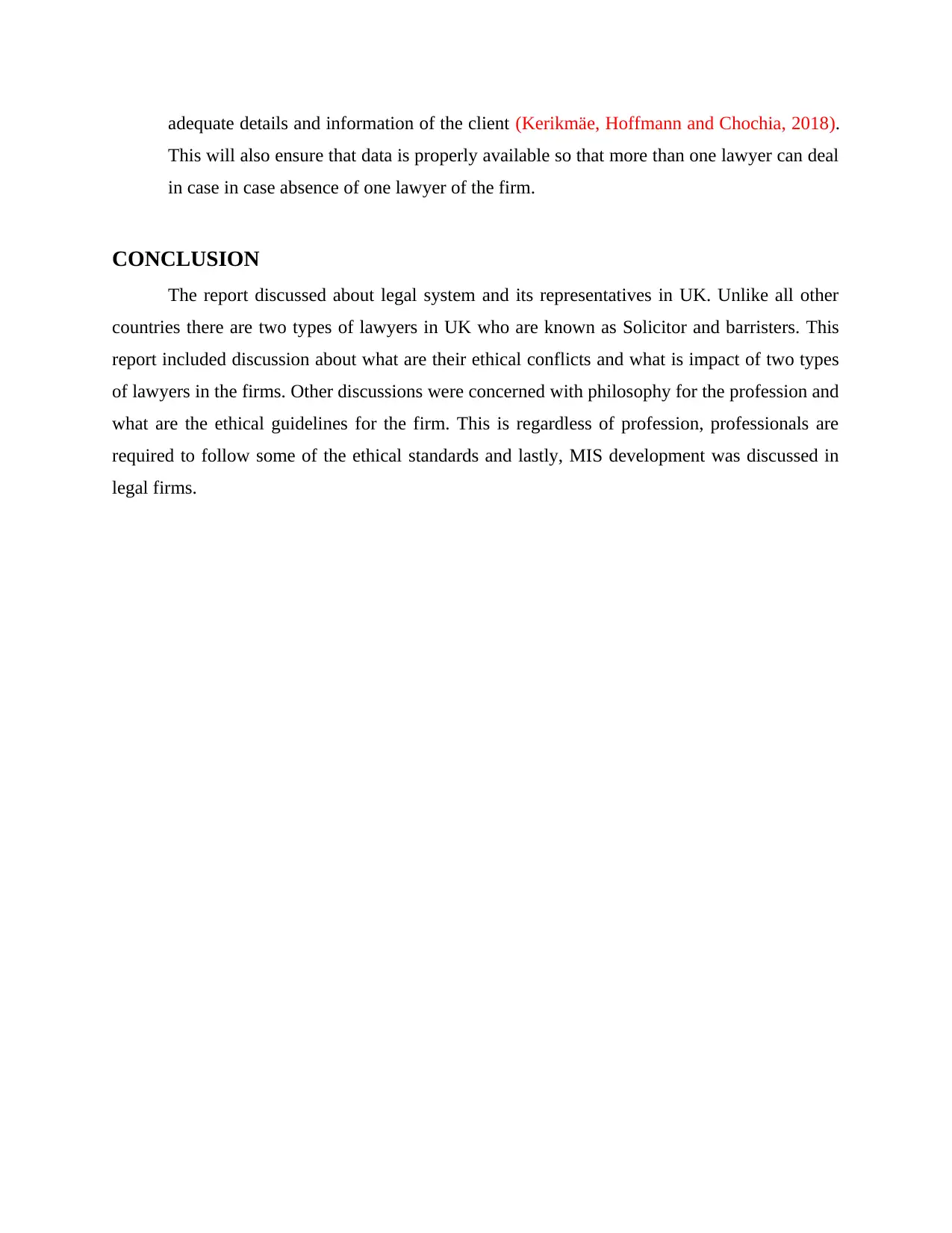
adequate details and information of the client (Kerikmäe, Hoffmann and Chochia, 2018).
This will also ensure that data is properly available so that more than one lawyer can deal
in case in case absence of one lawyer of the firm.
CONCLUSION
The report discussed about legal system and its representatives in UK. Unlike all other
countries there are two types of lawyers in UK who are known as Solicitor and barristers. This
report included discussion about what are their ethical conflicts and what is impact of two types
of lawyers in the firms. Other discussions were concerned with philosophy for the profession and
what are the ethical guidelines for the firm. This is regardless of profession, professionals are
required to follow some of the ethical standards and lastly, MIS development was discussed in
legal firms.
This will also ensure that data is properly available so that more than one lawyer can deal
in case in case absence of one lawyer of the firm.
CONCLUSION
The report discussed about legal system and its representatives in UK. Unlike all other
countries there are two types of lawyers in UK who are known as Solicitor and barristers. This
report included discussion about what are their ethical conflicts and what is impact of two types
of lawyers in the firms. Other discussions were concerned with philosophy for the profession and
what are the ethical guidelines for the firm. This is regardless of profession, professionals are
required to follow some of the ethical standards and lastly, MIS development was discussed in
legal firms.
Paraphrase This Document
Need a fresh take? Get an instant paraphrase of this document with our AI Paraphraser
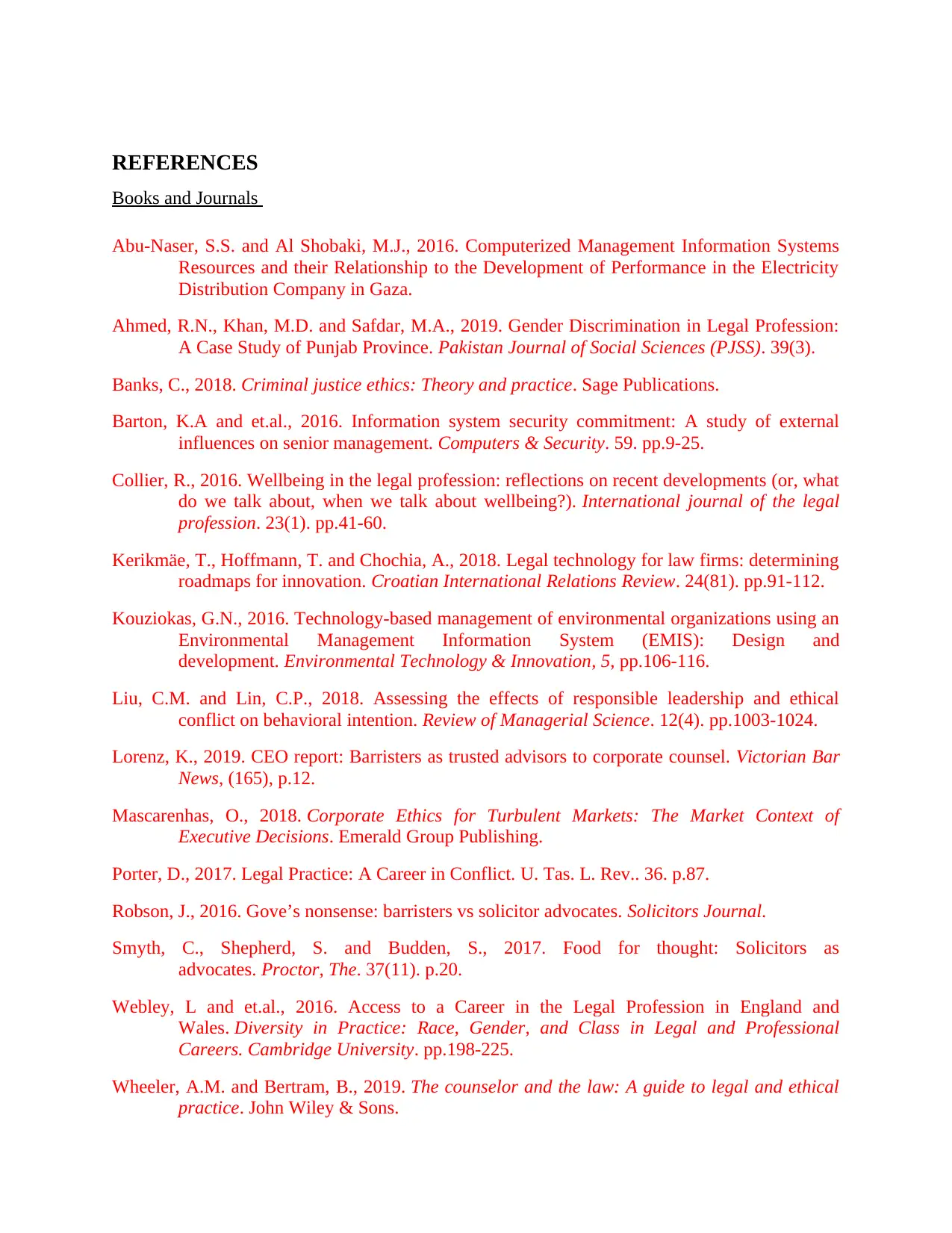
REFERENCES
Books and Journals
Abu-Naser, S.S. and Al Shobaki, M.J., 2016. Computerized Management Information Systems
Resources and their Relationship to the Development of Performance in the Electricity
Distribution Company in Gaza.
Ahmed, R.N., Khan, M.D. and Safdar, M.A., 2019. Gender Discrimination in Legal Profession:
A Case Study of Punjab Province. Pakistan Journal of Social Sciences (PJSS). 39(3).
Banks, C., 2018. Criminal justice ethics: Theory and practice. Sage Publications.
Barton, K.A and et.al., 2016. Information system security commitment: A study of external
influences on senior management. Computers & Security. 59. pp.9-25.
Collier, R., 2016. Wellbeing in the legal profession: reflections on recent developments (or, what
do we talk about, when we talk about wellbeing?). International journal of the legal
profession. 23(1). pp.41-60.
Kerikmäe, T., Hoffmann, T. and Chochia, A., 2018. Legal technology for law firms: determining
roadmaps for innovation. Croatian International Relations Review. 24(81). pp.91-112.
Kouziokas, G.N., 2016. Technology-based management of environmental organizations using an
Environmental Management Information System (EMIS): Design and
development. Environmental Technology & Innovation, 5, pp.106-116.
Liu, C.M. and Lin, C.P., 2018. Assessing the effects of responsible leadership and ethical
conflict on behavioral intention. Review of Managerial Science. 12(4). pp.1003-1024.
Lorenz, K., 2019. CEO report: Barristers as trusted advisors to corporate counsel. Victorian Bar
News, (165), p.12.
Mascarenhas, O., 2018. Corporate Ethics for Turbulent Markets: The Market Context of
Executive Decisions. Emerald Group Publishing.
Porter, D., 2017. Legal Practice: A Career in Conflict. U. Tas. L. Rev.. 36. p.87.
Robson, J., 2016. Gove’s nonsense: barristers vs solicitor advocates. Solicitors Journal.
Smyth, C., Shepherd, S. and Budden, S., 2017. Food for thought: Solicitors as
advocates. Proctor, The. 37(11). p.20.
Webley, L and et.al., 2016. Access to a Career in the Legal Profession in England and
Wales. Diversity in Practice: Race, Gender, and Class in Legal and Professional
Careers. Cambridge University. pp.198-225.
Wheeler, A.M. and Bertram, B., 2019. The counselor and the law: A guide to legal and ethical
practice. John Wiley & Sons.
Books and Journals
Abu-Naser, S.S. and Al Shobaki, M.J., 2016. Computerized Management Information Systems
Resources and their Relationship to the Development of Performance in the Electricity
Distribution Company in Gaza.
Ahmed, R.N., Khan, M.D. and Safdar, M.A., 2019. Gender Discrimination in Legal Profession:
A Case Study of Punjab Province. Pakistan Journal of Social Sciences (PJSS). 39(3).
Banks, C., 2018. Criminal justice ethics: Theory and practice. Sage Publications.
Barton, K.A and et.al., 2016. Information system security commitment: A study of external
influences on senior management. Computers & Security. 59. pp.9-25.
Collier, R., 2016. Wellbeing in the legal profession: reflections on recent developments (or, what
do we talk about, when we talk about wellbeing?). International journal of the legal
profession. 23(1). pp.41-60.
Kerikmäe, T., Hoffmann, T. and Chochia, A., 2018. Legal technology for law firms: determining
roadmaps for innovation. Croatian International Relations Review. 24(81). pp.91-112.
Kouziokas, G.N., 2016. Technology-based management of environmental organizations using an
Environmental Management Information System (EMIS): Design and
development. Environmental Technology & Innovation, 5, pp.106-116.
Liu, C.M. and Lin, C.P., 2018. Assessing the effects of responsible leadership and ethical
conflict on behavioral intention. Review of Managerial Science. 12(4). pp.1003-1024.
Lorenz, K., 2019. CEO report: Barristers as trusted advisors to corporate counsel. Victorian Bar
News, (165), p.12.
Mascarenhas, O., 2018. Corporate Ethics for Turbulent Markets: The Market Context of
Executive Decisions. Emerald Group Publishing.
Porter, D., 2017. Legal Practice: A Career in Conflict. U. Tas. L. Rev.. 36. p.87.
Robson, J., 2016. Gove’s nonsense: barristers vs solicitor advocates. Solicitors Journal.
Smyth, C., Shepherd, S. and Budden, S., 2017. Food for thought: Solicitors as
advocates. Proctor, The. 37(11). p.20.
Webley, L and et.al., 2016. Access to a Career in the Legal Profession in England and
Wales. Diversity in Practice: Race, Gender, and Class in Legal and Professional
Careers. Cambridge University. pp.198-225.
Wheeler, A.M. and Bertram, B., 2019. The counselor and the law: A guide to legal and ethical
practice. John Wiley & Sons.

1 out of 9
Related Documents
Your All-in-One AI-Powered Toolkit for Academic Success.
+13062052269
info@desklib.com
Available 24*7 on WhatsApp / Email
![[object Object]](/_next/static/media/star-bottom.7253800d.svg)
Unlock your academic potential
© 2024 | Zucol Services PVT LTD | All rights reserved.





